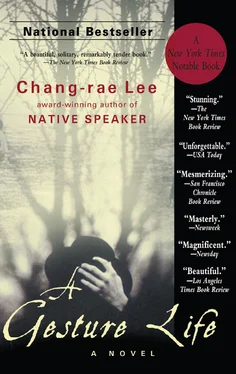And then, surprisingly, I was caught off guard by my own stirring, at least the sudden thrum-thrum in my chest as I shook his small hand goodbye, which was a sensation one might usually describe as both sweet and bitter but to me was also squarely, terribly rueful, as I realized how brief and few my times with him might be in future days. It seems curious, all these years alone and my rarely thinking twice of the larger questions, perhaps save certain reconsiderations in the last few weeks, but now the simple padding touch of his boy’s fingers seemed to have the force of a thousand pulling hands. It was everything I could do to heed his mother’s unspoken (though readily clear) wishes and keep a dignified face and uneventfully leave him until our next time together, which was as yet unarranged.
So I went out from the Lerner’s feeling as though my spirit was being loosed into the expansive, dusky caverns of the mall, wafting upward against the bank of skylights whose grimy filter recast the bright autumn sunshine into a hazy, gauzy glow. I felt lacking, of course, bereft in the thought of my adopted daughter and her son simply staying behind in the store, as they must do at the end of every afternoon and with hardly a thought of missing anything or anyone. And I thought if I were the boy, what would I know tonight except that a silver-haired man with wiry fingers had taken me around and bought me things and seemed to know Momma well enough and had plenty of the money she did not? What would I remember by the next afternoon, except for his old man’s voice like a soft bellows, the strangely slow shuffle of his feet, his high, weak cough? For who was I to him, really, or to his mother, for that matter, but a too-late-in-coming, too-late-in-life notion of a grandfather, a sorry, open-handed figure of a patriarch, come back hungry and hopeful to people he never knew?
As such, I wouldn’t have blamed Sunny if she couldn’t help but make a scene and denounce me in front of all. Perhaps I would have welcomed it had she thought twice about my reappearance in her life and flashed me those hard eyes from her youth; that way, at least, I might not have come back to this house of mine sensing that it had grown even vaster — and me that much smaller within it — in the wake of the easy, joyful hours I spent with her son. And then my having the companion feeling, too, that my life had all at once become provisional again, the way a young man’s might be, open to possibility and choice and then vulnerability as well, a state of being I have always treated with veritable dread. For it is the vulnerability of people that has long haunted me: the mortality and fragility, of the like I witnessed performing my duties in the war, which never ceased to alarm, but also the surprisingly subject condition of even the most stolid of men’s wills during wartime, the inhuman capacities to which they are helplessly given if they have but ears to hear and eyes to see.
In my car in the parking lot, I sat for a few minutes with the engine running before I drove away. A particular sight was arresting me — and not of Tommy or Sunny. Rather, it was an otherwise insignificant notice: that group of Middle Eastern men who had opened the temporary Halloween store just the week before were already dismantling their modest, homespun window displays before Halloween had even arrived, stripping the shop. I was on my way out but stopped to watch them for a moment. They did not appear too upset or disturbed, just went about their work the same steady way as they had begun it. I felt badly for them, of course, knowing that they must be losing a decent amount of money, and that they were presumably stemming their losses with this very quick closing. They were again out in front of the place with ladders, unsticking the paper banners and signs, and I noticed inside the store a teenaged boy and girl sitting at chairs and working beside each other, the girl folding up various-sized squares of black cloth, Halloween table linens and napkins, and placing them in boxes. The young man wasn’t as serious as the girl (his twin sister?), in fact he was clearly enervated by the task and was effortfully closing up each small box, fitfully running a tape dispenser across the tops. He was talking to her, but it seemed in a haranguing sort of way, his jawbone working continuously. There was a short stack of the taped boxes beside him, which he kept kicking lightly with the side of his foot. The girl, a slender young woman with high, wide-set eyes, wouldn’t be annoyed by his attitude. She steadily made her way through a heaping, messy bin of the dark fabric. She would take each piece and shake it free of its haphazard folds and smooth it down flat on her lap, then begin to fold it again from corner to corner. The boy finished sealing a box and, having no others, watched her diffidently. She was picking another square of cloth from the bin and beginning her procedure, when he reached over and meanly picked at it, causing it to fall to her feet. She paused, then retrieved it and started over. But again he messed up her work. This happened twice more until finally the girl took the cloth and shook it open and placed it over her own head. The boy was confused. She sat there with her face covered in black, and he yelled at her once and then rose abruptly and left her.
The girl remained there, under the veil, unmoving for some time. And as I sat parked in the mostly empty lot in the long shadow of the mall, I felt I understood what she was meaning by her peculiar act, how she could repel his insults and finally him by making herself in some measure disappear. As if to provide the means of her own detachment. It was because of this notion — as well as the simple cloth itself, similar enough to the swath Sunny once found in a lacquered box in my closet — that I remembered the girl again, Kkutaeh, the one I came to call simply K, and the events in our camp in those last months of the war.
* * *
AFTER THE KILLING, and the execution of Corporal Endo, it was unusually quiet in the camp. It was then that K was placed under my care. This under direct order by the doctor, Captain Ono. He determined that she was despondent and suicidal, and possibly dangerous to others, particularly to the other girls. I had no reason to doubt his appraisal as I hadn’t observed her or spent any length of time with her, nor would I have disagreed with him had I believed otherwise. He found me one afternoon doing paperwork and called me out into the small clearing behind the infirmary, where our medical wastes and other garbage were discarded. He said gravely, “I have determined that the girl (he always called her this, never referring to any of the others) is a risk and should be quarantined periodically. What will happen is that I will let the intervals be known to you, and under my authority you will remove her from her service and examine her thoroughly.”
“Yes, sir,” I said. “But what shall I examine her for?”
“For infection and disease,” he said sharply, staring at me as if I were a total fool. “You will prepare and treat her if necessary. I expect her to be free of illness when she comes to me. Keep her and isolate her beforehand.”
“Here in the infirmary, sir?”
“Where else, Lieutenant! Come up with something, can’t you? For all I care you can use the surplus supply closet. In fact, that will do. You’ll lock her inside, of course. Do you understand, Lieutenant?”
“Yes, sir,” I told him, though not being completely certain of what he was actually ordering me to do. I stood waiting at attention, but he was silent. I could normally “remove her from her service” for medical reasons, with his permission, of course, but to select her out regularly, and only her, before indications of an illness or malady was unusual indeed.
Читать дальше











![William Frith - John Leech, His Life and Work. Vol. 1 [of 2]](/books/747171/william-frith-john-leech-his-life-and-work-vol-thumb.webp)
![William Frith - John Leech, His Life and Work, Vol. 2 [of 2]](/books/748201/william-frith-john-leech-his-life-and-work-vol-thumb.webp)